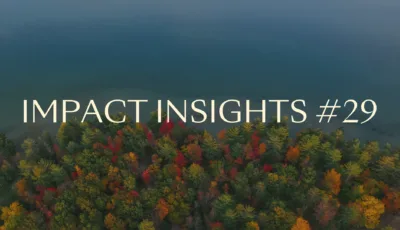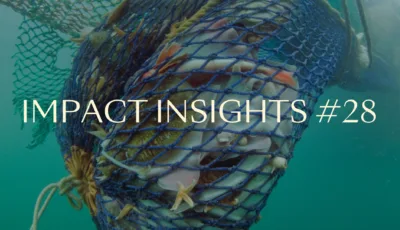Chasing unicorns is not going to bridge the 7 trillion calorie gap
On paper, the deployment of USD $28.6bn of impact venture funding in the food space since 2020, according to Dealroom, seems to represent a significant step towards addressing the challenges facing our global food systems. It accounts for 16% of total impact venture investments in that period. However, if we take a closer look we see that most capital flows to narrow solutions such as “alternative proteins” or “precision agriculture”, which do not address the much-needed structural changes in how we grow, process and consume our food.
As impact investors, we have a central role to play in financing the right solutions to transform and future-proof our food systems. Our focus should not be on chasing unicorns or disrupting for the sake of disruption. We mustn’t invest in hypes, but support companies that bring the systemic change we need to build a sustainable future.
This article sheds light on two areas that deserve more attention in helping bridge the 7 trillion calorie gap to feed 9.3 billion people in 2050. First of all, we need to eat more of what we already produce and reduce food waste. Secondly, we should think of farmers as enablers of building resilient, sustainable food systems, rather than pushing them out with technology.
Eat what we produce: tackling food waste
Since experts such as Poore & Nemecek highlighted the dreadful environmental impact of our diets, “alternative proteins” have been heralded as the saving grace of the food industry. Dealroom data show that the sector has taken the lion’s share of food impact-VC funding, with USD $13.4bn invested since 2020, nearly half of total food impact investments. Yet, after facing some growth limitations, specialized plant-based investors are starting to admit the scalability issues of the industry, and that protein replacements are not necessarily better from a holistic sustainability perspective. So what has been overlooked in the pursuit of immediate impact at scale?
It’s pretty straightforward: we need to first consume what we already produce. The magnitude of the food waste problem is mind-blowing. 24% of food's emissions come from food that is lost in supply chains or wasted by consumers. That's a staggering 6% of total global greenhouse gas emissions, ranking it the third largest emitter globally only behind China and the US. Halving food waste would represent a 4.64 gigaton CO2 emission reduction.
With this in mind, one might believe that the food waste issue has attracted a similar level of interest from investors as alt-protein. Dealroom data shows that only USD $3.5 billion of capital has been allocated to food waste startups since 2020. In comparison, that’s only 25% of what alt-protein startups raised in the same period. At Norselab we have been quite conscious of the waste issue in general as part of our thesis on resource efficiency. We have backed several startups tackling the (food) waste problem at different stages of the supply chain, with the likes of Antec, focusing on upcycling organic waste into renewable biogas, Carrot, focusing on incentivizing waste reduction in commercial real estate, and Plateful, focusing on redirecting food surplus from the retail trade into the on-trade - with over 3,800 tons of food brought to people’s plates since 2021 in Norway alone.
Make farmers part of the solution
We must work together with farmers if we want to transform our food systems, and they require more support than ever. Many tech investors and entrepreneurs are investing in AgTech startups that look at replacing farmers instead of supporting them.
For instance, $3 billion has been invested in vertical farming startups since 2020, according to Dealroom, despite the challenges in building viable business models to which attest the bankruptcies of companies like Agricool, Fifth Season or Future Crops. Or as Prof. Eric Steyn of Penn State puts it: “Is it worth spending $20 million on a cutting-edge [vertical farm] system when you’re producing objects that might get $1 or $2 in the marketplace?”.
Farmers are under a lot of pressure. With a 33% reduction in arable land and a 61% decrease in the agricultural workforce over the past few decades, farmers face the challenge of producing more food with fewer resources. They also have to deal with financial pressures, getting a smaller share of what consumers spend on food and accumulating debt to finance their increasingly capital-intensive activities. Eurostat figures show that farmers' wages are consistently below the average gross market wages in the respective markets, even after CAP subsidies and redistributions, highlighting the financial struggles they face.
Impact investors should embrace farmers. It is essential to develop farmer-centric solutions to align incentives and encourage farmers to invest in more sustainable farming practices. Norselab is partnering with Farmable, a digital farming tool designed by farmers for farmers, to provide them with the easiest and most intuitive solution. This approach has been successful, with over 30,000 farmers registered in over 120 countries, mapping over 60,000 fields and 1 million hectares to date. Instead of focusing on cutting-edge but often expensive precision agriculture technologies, we need to consider solutions that address the core operations and pain points that matter most to farmers.
At Norselab, we believe that urgent action is needed to build a resilient and sustainable food system. We are here to back innovative solutions that can make a real difference. Whether you're an entrepreneur with a bold plan to tackle these issues head-on or an investor who shares our passion for driving positive change, get in touch with Jean-Guillaume at jgm@norselab.com to explore how we can work together to create a meaningful future for all.
About Jean-Guillaume Marquaire
Jean-Guillaume Marquaire is a seasoned business operator and experienced investor within the Food & Beverage space, where he has also held different management positions for multinationals and scaleups. He is always on the lookout for new investment cases related to producing safe and nutritious food for a growing global population while taking better care of available resources.


